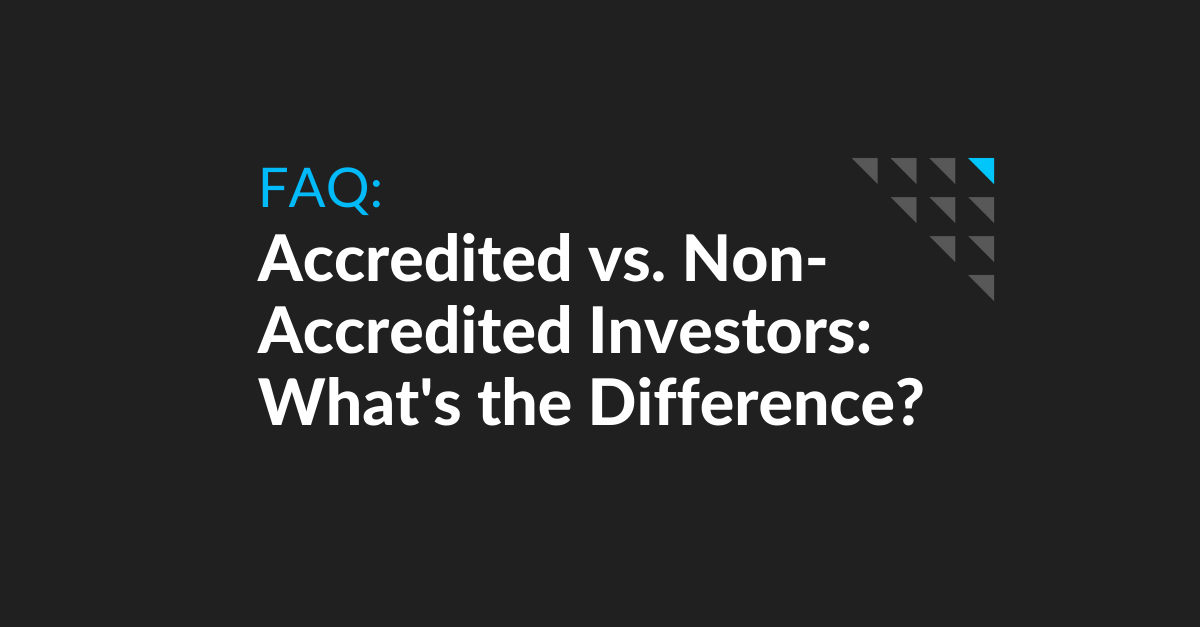All Categories
Featured
Table of Contents
A private should have a total assets over $1 million, leaving out the main residence (independently or with partner or companion), to certify as an approved capitalist. Showing sufficient education and learning or job experience, being a signed up broker or financial investment expert, or having particular professional certifications can also qualify a specific as an approved financier.
Approved investors have access to financial investments not registered with the SEC and can include a "spousal matching" when identifying credentials. Recognized financiers may deal with potential losses from riskier financial investments and need to confirm economic sophistication to participate in uncontrolled financial investments (investment requirements). Approved investor standing issues because it establishes eligibility for investment chances not offered to the general public, such as exclusive positionings, financial backing, hedge funds, and angel financial investments
Earn Your Accredited

To take part, approved investors must come close to the company of non listed safeties, that may need them to complete a questionnaire and offer economic documents, such as income tax return, W-2 forms, and account statements, to confirm their status. Regulations for recognized financiers are overseen by the U.S. Stocks and Exchange Commission (SEC), making certain that they meet specific monetary and specialist criteria.
This development of the accredited investor swimming pool is planned to preserve capitalist defense while offering higher access to non listed financial investments for those with the needed monetary sophistication and danger resistance. - qualified investor net worth
Accredited Company Definition
Realty syndication is somewhat similar to REITs because it additionally entails pooling resources to buy genuine estate financial investments. A submission bargain is when numerous financiers pool their sources together to purchase a solitary actual estate home. This offer is created by a syndicator, also understood as the general sponsor.
These capitalists will provide the majority of the resources needed to get the residential property. The difference with REITs is that you can select what syndication deals to participate in. If you count on the realty building being syndicated, you can join as one of the easy financiers. Realty submission can be made with any type of type of realty, however multifamily syndication is the most prominent kind since multifamily residential or commercial properties usually create a great deal of consistent income.
These properties create consistent cash flow through month-to-month rental revenue. Additionally, these big buildings are normally harder to obtain as a single financier, which is why submission is an optimal configuration. Financiers can take part in multifamily realty investing with a much reduced minimum financial investment. The syndicator will certainly likewise supervise of home monitoring, meaning easy financiers do not need to fret about ending up being a landlord.
Certified capitalists do not have to collect rental income, offer with lessees, take care of emergency situations, spend cash on fixings, etc. Either the syndicator will certainly employ a 3rd event home supervisor to do this or they will certainly manage it themselves.
Sometimes the syndicator has a larger percentage of the equity. The capital is usually split among the individuals. This implies investors receive passive earnings from rents, and the ultimate building sales. This is based on what percentage of the property they have, relying on the bargain framework.
Us Accredited Investor Requirements

Our viewpoints are our own. An approved investor is an individual or organization that can spend in unregulated safety and securities.
Unregistered protections are inherently dangerous yet typically use higher prices of return. If you've ever before come across a financial investment available only to supposed recognized capitalists, you've most likely questioned what the term meant. The tag can put on entities ranging from substantial banking organizations and affluent Fortune 500 business, completely down to high-earning families and even people.
, approving market accessibility to smaller companies that might otherwise be squashed under the costs accompanying SEC enrollment.
Capitalists without accreditation can handle the full breadth of registered protections like supplies, bonds, and mutual funds. They can also build up riches, purchase property, construct retired life portfolios, take threats, and gain incentives the greatest difference is in the scale of these undertakings. One of the benefits of being a recognized capitalist is that when you obtain this condition, it "unlocks" access to items not available to the public, such as hedge funds, financial backing funds, exclusive equity funds, and angel investing.
As an example, the SEC takes into consideration hedge funds an extra "adaptable" investment strategy than something like common funds, since hedge funds use speculative practices like leverage and brief selling. Considering that these complex products require additional research and understanding, financiers require to show that they understand the risks associated with these sorts of financial investments before the SEC fits with them diving in
While many are primarily familiar with the SEC's customer protection initiatives, the regulative authority's commitments are really twofold. To guarantee that those two initiatives aren't in dispute, it's often required for the SEC to match up high-risk, high-reward opportunities with suitable investors.
Qualified Purchaser Definition
One aids navigate the uncontrolled market, and the other will drift you to safety need to the waves endanger. At the same time, the ordinary investor is safe on the beach or paddling in the shallows, secure under the watchful look of the lifeguard (i.e., the SEC). Safety and securities that are available to recognized capitalists are supplied through exclusive offerings, which may feature less guidelines than protections supplied to more regular investors.
By Percent - January 11, 2021 When it concerns purchasing stocks and bonds, quite a lot anyone can invest. As long as you more than the age of 18 (or 21, in some states), not trading on details, or not investing as part of a dispute of passion, you can be a part of public markets whether you have $1 or $1 million.
Particular financial investment lorries including those on Percent are only available to a course of financiers legitimately specified as These capitalists have the specific authorization from regulative bodies based upon a slim collection of standards to purchase particular kinds of investments secretive markets. That can be a certified capitalist? Much better yet, why are certified capitalists a thing to begin with? After the Great Depression, the U.S

This act needed investors to have a far better understanding of what they were spending in, while restricting misrepresentations, scams, and deception in protection sales. Congress thought this law would protect the "regular" financier. Private offerings those beyond the general public supply exchanges were exempt from securities legislations, which produced some concerns.
The Stocks and Exchange Commission (SEC) ultimately embraced regulation 501 of Regulation D, which defined that could spend in exclusive offerings and specified the term "recognized capitalist" a term that was later on updated in 2020. A certified financier is anybody that meets any of the complying with criteria: Financiers with earned revenue that surpassed $200,000 (or $300,000 together with a partner) in each of the prior two years, and anticipates to satisfy the same criteria in the existing year.
Those that are "experienced employees" of an exclusive fund. SEC- and state-registered investment advisers (but not reporting experts) of these entities can likewise now be taken into consideration recognized capitalists.
Accredited Real Estate Funds

If you have a net worth of over $1 million (not including your main property/residence), made $200,000+ a year for the last 2 years, or have your Series 7 license, you can make financial investments as an approved investments. There are many other qualifications (as you can locate above), and the SEC plans on including a lot more in the future.
Because the early 1930s, federal government regulatory authorities have found it tough to shield capitalists secretive offerings and securities while at the same time sustaining the growth of start-ups and other young companies - firms that several believe are in charge of most of task development in the United States - new accredited investor definition. Stabilizing this task had actually been leading edge of the mind of the Securities and Exchange Compensation ("SEC") for many years
Table of Contents
Latest Posts
Foreclosed Tax Properties
Property Tax Delinquent Lists
Learn Tax Lien Investing
More
Latest Posts
Foreclosed Tax Properties
Property Tax Delinquent Lists
Learn Tax Lien Investing